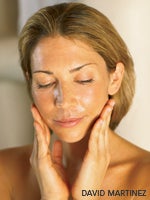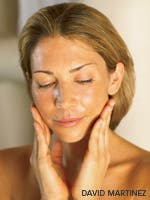Sea Kelp for Silky Skin


If you’ve ever touched seaweed that washed up on the beach, chances are you noticed its slippery texture. The gelatinous quality of this sea plant makes it an ideal ingredient for shampoos and creams, as it protects and adds shine to hair and skin. In fact, many marine plants—from tiny algae to giant kelp—provide nourishment and protection when applied to the body.
“Algae are some of the most nutrient-rich life forms in nature, which is why they’re present in so many cosmetics,” says Ben Fuchs, cosmetic formulator for Rocky Mountain Natural Labs in Boulder, Colorado. “They’re full of minerals that can help draw toxins from the skin.”
Knowing about marine herb properties will help you understand their purpose in body care products. In cellulite creams, algae helps draw out impurities and temporarily “tightens” the skin. This firming ability is also an asset in eye gels or wrinkle creams. Sea herbs in facial masks heal, hydrate, detoxify, and re-mineralize the skin. While Fuchs cautions that we still don’t know how much of the nutrients actually penetrate the skin, their amino acids—and slippery texture—do act as conditioners.
To identify seaweed on labels, look for either common or Latin names: bladderwrack (fucus), kelp (laminaria), Irish moss (sometimes listed as carrageenan, the name of the extract), SuperPhycoDismutase (or SPD, the name of an extract of a French coastal seaweed), or simply algae extract. Most of these sea herbs contribute a silky texture to creams and act as natural thickening agents, making it easy to benefit from the power of the ocean—even if you live far from its shores.
Sea algae provides:
Chlorophyll: helps detoxify
Essential fatty acids: improve skin elasticity
Carbohydrates: stimulate the skin’s ability to heal
Vitamin A: an antioxidant, normalizes skin cells
Protein/amino acids: building blocks of cells, skin conditioners
Source: Ben Fuchs